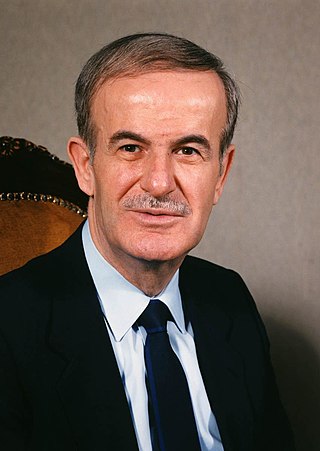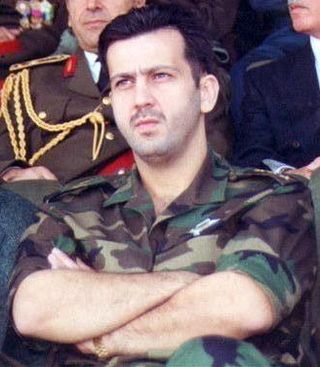
Hafez al-Assad was a Syrian politician, dictator and military officer who served as the 18th president of Syria from 1971 until his death in 2000. He had previously served as prime minister of Syria from 1970 to 1971 as well as regional secretary of the regional command of the Syrian regional branch of the Arab Socialist Ba'ath Party and secretary general of the National Command of the Ba'ath Party from 1970 to 2000. Hafez al-Assad was a key participant in the 1963 Syrian coup d'état, which brought the Syrian regional branch of the Arab Socialist Ba'ath Party to power in the country, a power that lasted until the fall of the regime in 2024, then led by his son Bashar.

Rifaat Ali al-Assad is a Syrian former military officer and politician. He is the younger brother of the late President of Syria, Hafez al-Assad, and Jamil al-Assad, and the uncle of the former President Bashar al-Assad. He was the commanding officer of the ground operations of the 1982 Hama massacre ordered by his brother.

Abdul Halim Khaddam was a Syrian politician who served as interim President of Syria in 2000. He also was Vice President of Syria and the Syrian High Commissioner to Lebanon from 1984 to 2005. He was a long known loyalist of Hafez Assad. He resigned from his position and left the country in 2005 in protest against certain policies of Hafez's son and successor, Bashar Assad. He accumulated substantial wealth while in office: a Credit Suisse account in his name, opened in 1994, had nearly 90 million Swiss francs in September 2003, per Suisse secrets. This puts Khaddam and his family's net worth at $1.1 billion, making them one of the wealthiest and most influential political families in the Middle East.

Major General Maher Hafez al-Assad was a Syrian military officer who served as commander of the Syrian Army's elite 4th Armoured Division, which, together with Syria's Military Intelligence, formed the core of the country's security forces until the collapse of Al-Assad's regime in 2024. He is the younger brother of former Syrian president Bashar al-Assad, and also was a member of the Central Committee of the Syrian Ba'ath Party.

Assef Shawkat was a Syrian military officer and intelligence chief who was the Deputy Minister of Defense of Syria from September 2011 until his death in July 2012. He was the brother-in-law of former Syrian President Bashar al-Assad, having married his older sister Bushra.
Jamil al-Assad was a younger brother of the late Syrian president Hafez al-Assad, and the uncle of former Syrian President Bashar al-Assad. He served in the Parliament of Syria, called the majlis ash-sha'b from 1971 until his death. He was also commander of a minor militia.
Asad, sometimes written as Assad, is an Arabic male given name literally meaning "lion". It is used in nicknames such as Asad Allāh, one of the by-names for Ali ibn Abi Talib.

Gebran Ghassan Tueni was a Lebanese politician and the former editor and publisher of daily paper An Nahar, established by his grandfather, also named Gebran Tueni, in 1933. He was assassinated in 2005 as part of a series of assassinations of Syria's critics in Lebanon.
Terrorism in Syria has a long history dating from the state-terrorism deployed by the Ba'athist government since its seizure of power through a violent coup in 1963. The Ba'athist government have since deployed various types of state terrorism; such as ethnic cleansing, forced deportations, massacres, summary executions, mass rapes and other forms of violence to maintain its totalitarian rule in Syria. The most extensive use of state terrorism in the 21st century was the extensive state deployed violence against civilians during the 2004 Qamishli massacre.

Bushra al-Assad is the first child and only daughter of Hafez al-Assad, who was the president of Syria from 1971 to 2000. She is the sister of former Syrian President Bashar al-Assad. She is the widow of Assef Shawkat, the deputy chief of staff of the Syrian Armed Forces and former head of the Syrian Military Intelligence, who was killed in the 18 July 2012 explosion in Damascus claimed by a coalition of Syrian opposition rebel groups.
Hafez Mohamad Makhlouf, also known as Hafez Makhlouf, is a Syrian brigadier general and intelligence officer who headed the Damascus branch of the Syrian General Intelligence Directorate. He was a member of former Syrian president Bashar al-Assad's inner circle of close supporters.

The Assad family ruled Syria from 1971, when Hafez al-Assad became president under the Ba'ath Party following the 1970 Coup, until Bashar al-Assad was ousted on December 8, 2024. Bashar succeeded his father after Hafez's death in 2000.
Ali Issa Ibrahim Duba, better known as Ali Douba, was a Syrian military officer who was the head of the Military Intelligence Directorate of Syria under Hafez al-Assad as well as his close adviser. Under Douba’s leadership, the Military Intelligence Directorate was the most important security agency in Syria, responsible for maintaining security within the army and safeguarding the regime.
The 1999 Latakia protests were violent protests and armed clashes, which erupted in Latakia, Syria following 1998 People's Assembly's Elections. The violent events were an explosion of a long-running feud between Hafez al-Assad and his younger brother Rifaat. Two people were killed in fire exchanges of Syrian police and Rifaat's supporters during police crack-down on Rifaat's port compound in Latakia. According to opposition sources, denied by the government, the protests left hundreds of dead or injured.

The Kalbiyya, or Kalbi or Kelbi tribe is one of four tribes, or tribal confederations, of the Alawite community in Syria. Appearing in historical sources from the 16th century, the Kalbiyya came to prominence when Hafez al-Assad, the son of a Kalbiyya tribal leader, seized power in Syria in a coup in 1970. Assad ruled Syria as dictator for 30 years and ensured that power was concentrated in the hands of members of the Kalbiyya tribe, a policy which his son, Bashar Al-Assad, continued after he became president in 2000. The Kalbiyya population mainly live in the Latakia Governorate in north west Syria.

AnisaMakhlouf was the matriarch of the Syrian Al-Assad family, which ruled the country from 1971 to December 2024. The wife of the late Syrian President Hafez al-Assad, Makhlouf remained the Syrian First Lady from 1971 until 2000. Her son Bashar al-Assad was President of Syria from 2000 until the Assad regime was overthrown in 2024.
Shafiq al-Fayadh was a Syrian military officer and former commander of the Syrian Army's 3rd Division and a close adviser to President Hafez al-Assad. He was also one of the members of his inner circle.
Ali Haydar, known as the "Father of the Syrian Special Forces", was a Syrian military officer who was the commander of the Syrian Special Forces for 26 years. He was a close confidant to President Hafez al-Assad and one of the members of Assad's inner circle. Born in the village of Hallet Ara, Haydar was a member of the Ba'ath Party from his youth. He was commissioned into the Syrian Army in 1952 after a stint studying at the Homs Military Academy. After the Ba'ath Party seized power in a 1963 coup d'état, Haydar was put in charge of Syria's special forces and supported al-Assad in his rise to the presidency. During this time he was deployed to Lebanon during their civil war. Haydar opposed the 1984 coup d'état attempt led by Rifaat al-Assad, instead remaining loyal to Hafez al-Assad. After suffering an aneurysm and leaving his post in 1988, he returned to lead the special forces again in the early 1990s. At the time a Major General, he was formally removed from his position and then imprisoned in August 1994, though he was treated well during his brief prison stay and was released without a trial or public humiliation. Haydar died in Latakia at the age of 90.
Hafez al-Assad, the 18th president of Syria, died from a heart attack on 10 June 2000 at the age of 69. His funeral was held three days later in Damascus, and he was buried in a mausoleum in his hometown Qardaha in Latakia Governorate, beside his eldest son Bassel al-Assad who died in 1994.

Bahjat Suleiman, also known as Bahjat Sulayman, was a Syrian Ambassador to Jordan and head of the internal branch of the Syrian General Intelligence Directorate (GID), also known as Branch 251, in Syria. He was instrumental in the accession of Syrian President Bashar Al-Assad to the presidency and was considered to be his confidant and mentor, and in his "inner circle."












